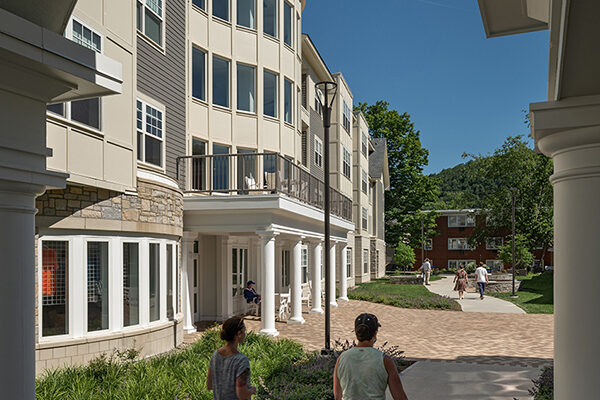Chapel Haven Schleifer Center Fund
Est. 2021 by anonymous donors

Home: that place where you are most yourself, where you fashion a life of your own making, with good friends nearby.
Creating an opportunity for individuals with developmental and social disabilities to find a home and live independently is at the heart of The Community Foundation’s Chapel Haven Schleifer Center Fund, said Michael Storz, the center’s president.
Chapel Haven is a pioneer in the development of a transition program for individuals with Autism spectrum disorders, Asperger’s syndrome, Down syndrome, cerebral palsy, an array of differences and needs. Adults 18 years and older enroll in an intensive, two-year residential experience with a curriculum focused on developing life skills. Eighty percent of those adults choose to stay on in Chapel Haven’s supported living community.
Most individuals arrive “needing some level of 24-hour supervision” but after graduating they need just four hours a week in support — whether it’s budgeting finances, getting their apartment in order, or having someone to talk with about how work or life is going, according to Storz.
“Our program participants get their own apartments or their own condos. They might move in with a roommate or not; it’s their choice,” Storz continues. Individuals who need additional support can choose to live on the Chapel Haven campus in a more supervised setting. In either case, “they get jobs. They are productive members of society and they have better social and recreational lives than many of us do. We have adults who form relationships and get married.”
Close to 90 percent of the graduates of the program choose to stay in the Westville neighborhood near the Whalley Avenue campus because they “love the life they’ve made with their community of friends.” More than 250 people have graduated from the program and some have lived independently in the neighborhood for more than 40 years.
But, Storz said, the major obstacle has been the cost of the two-year transitional program. Because it isn’t federally or state funded, the program “can be out of reach for many, many individuals,” he explains.
Thanks to the Chapel Haven Schleifer Center Fund, “there is a bridge so that families who would not have been able to afford our program now can,” Storz said. “It’s a priceless gift.”
The donors who established the Fund, and wish to remain anonymous, said they have seen the profound impact Chapel Haven has had. They wanted to make access to such a program more equitable, so that more people have the chance to be part of all the possibilities that unfold as a result of the program so they can live a full and fulfilling independent life.
Storz said he receives calls from parents saying how happy their child is, how they’ve achieved an independence the parents hadn’t thought possible and how it has also changed their own lives and the lives of the rest of the family.
“The ripple effect of this gift — the Chapel Haven Schleifer Center Fund — is endless,” he said.
Make a donation
